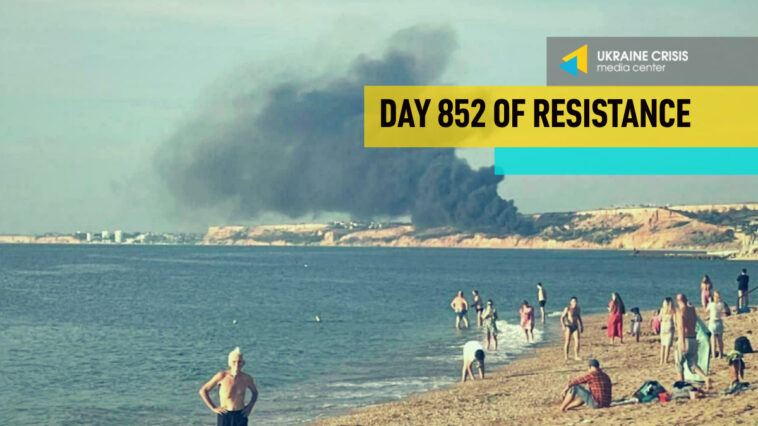Russia launched cruise missiles at Odesa and ballistic missiles at Pokrovsk on Monday morning. Russian air defenses shoot down Ukraine’s missiles over a beach in Crimea, causing casualties. The EU approves a first tranche of military aid to Ukraine from frozen Russian assets.
Russia launches cruise missiles at Odesa, ballistic missiles at Pokrovsk
A Russian missile attack on Odesa on Monday morning damaged a storage facility and injured at least four people, head of the regional military administration, Oleh Kiper said. Firefighters were battling a fire caused by the strike.
Ukraine’s Air Force said it had prevented one of two Iskander-K cruise missiles launched by Russia from reaching the target.
Russia also launched a number of airstrikes with glide bombs on Kherson region in the early hours of Monday, the Ukrainian Air Force said. A Russian Zala reconnaissance drone was destroyed over Mykolayiv region on Sunday, it added.
Russian missiles killed five people and wounded 41 others, including four children, in the town of Pokrovsk, in Donetsk region on Monday, head of the regional military administration, Vadym Filashkin said.
“There are four children among the wounded: a 12-year-old boy, and girls ages nine, 11, and 13,” Filashkin said. “The injured were taken to a hospital in Pokrovsk offering intensive care,” he added.
Filashkin said Russian forces launched two Iskander-M ballistic missiles at the town. The attack destroyed one private house and damaged 16 more, he added.
Russian air defenses shoot down Ukraine’s missiles over a beach in Crimea, causing casualties
Loud explosions rocked Sevastopol shortly after noon on Sunday. Russia said it had shot down five ATACMS missiles and that the attack had caused casualties.
“When repelling a terrorist attack, the air defense systems shot down four U.S. ATACMS missiles. Another missile deviated from its flight trajectory in the final section due to the impact of air defenses, with the warhead exploding in the air over the city,” the Russian Defense Ministry said.
Russian-installed Sevastopol governor, Mikhail Razvozhayev said the missiles were shot down over two beaches — those of Uchkuyivka and Lyubymivka, and that there were casualties.
As of reports on Sunday evening, four people were killed, including two children, and at least 151 others were injured, according to Razvozhayev. Eighty-two people were taken to hospital.
One of the victims killed in the strike was the nine-year-old daughter of Oleg Averyanov, Deputy Mayor of Magadan. She was on vacation with her parents in Sevastopol, the Mayor of Magadan, Yuri Grishan said.
“The Russian Defense Ministry stated that Russian forces deliberately made an ATACMS missile explode over a beach in Sevastopol ‘as a result of the work of the air defenses’ in order to direct the missile away from a military site. They openly confessed that what the Russian air defenses did had led to a missile explosion over a beach and caused a mass killing of civilians. They have committed a crime against their own civilians. The Russian Defense Ministry openly said that they had directed a missile at the beach! But they will surely pin the blame for their criminal activities on Ukraine,” Yuriy Butusov, Ukrainian journalist, editor-in-chief at Censor.net said on Telegram.
Following the strike, Razvozhayev declared a state of emergency in Sevastopol. He said 15 to 20 people that were injured in the attack could be taken to Moscow for medical treatment.
EU approves first tranche of military aid to Ukraine from frozen Russian assets
EU countries today approved a first tranche of up to €1.4 billion in military aid for Ukraine coming from the proceeds of frozen Russian assets, Politico said, citing four diplomats.
The money is channeled to Ukraine through the Ukraine Assistance Fund (UAF), but payments have been blocked by Hungary. However, the Council’s legal service argued that Budapest cannot stop these payments because it abstained in the vote earlier this year creating the UAF. The reason allowing the work-around is that the funds do not come from EU taxpayers, EU officials said.
The money won’t be used for reimbursements, as is normally the case with the UAF, but for direct purchases of kit like ammunition and aerial defense systems. A quarter of the amount will be used for purchases from Ukrainian industries.
Countries had until 11 a.m. to voice their opinion, and none cast a negative vote, according to an internal Council message seen by POLITICO. The decision did not require unanimity, meaning Hungary could not block it.
Despite today’s agreement, Hungary is continuing to block the payment of €6.6 billion under the UAF as a partial reimbursement for weapons purchased for Ukraine. According to one diplomatic, Budapest is “furious” at what happened today.
The final figure of the amount of profits from the frozen assets that will go to Kyiv is still unclear, but diplomats said it ranges between €1.2 billion and €1.4 billion.
The formal announcement is expected at a meeting of EU foreign ministers in Luxembourg on Monday.
Ukraine Peace Summit: Results and Prospects. Ukraine in Flames #628
In this episode of Ukraine in Flames, we discuss the outcomes of the Ukrainian peace summit, highlighting the summit’s success and its role in fostering peace and justice in Europe, and stressing the importance of international representation. Our guests also reflects on the summit’s significance in drawing global attention to the Russian-Ukrainian conflict and critiques the lack of African support. Watch UIF #628 to learn more about what to expect next from the results of the summit
Guests:
- Oleksandr Merezhko, MP
- Oleksandr Chupak, head of economic programmes at the Ukrainian Strategic Studies Centre
- Yevhen Magda, Director of the Institute of World Policy




